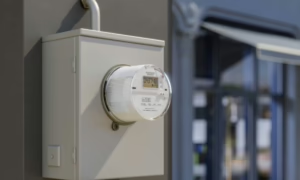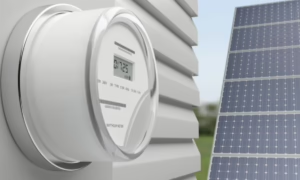With the world shifting more and more toward renewable energy, solar power is one option that is becoming increasingly popular. While solar panels are the most well-known aspect of solar systems, solar batteries are an essential part of what makes energy both efficient and reliable. Such batteries enable consumers to save solar power for future usage, particularly during the evening or in the case of power cuts.
This guide describes how solar batteries function, discusses such varieties as lithium-ion solar batteries, and also underscores their relationship with devices such as the solar inverter battery. We also consider the growing influence of solar panel distributors in India in facilitating the use of solar storage technology.
What is a Solar Battery?

A solar battery is a device which holds electricity accumulated from solar panels. Solar panels usually generate excess electricity during the daytime that’s not utilised straight away. Rather than allowing all that energy to go to waste or sell it back to the grid, a solar battery can accumulate and hold all of this surplus electricity for consumption at a future time.
This energy storage ability makes solar systems more efficient, less dependent on the electricity grid, and provides a steady supply of power even when sunlight is not available.
How a Solar Battery Functions?
The process of working with a solar battery involves a few critical steps:
1. Energy Generation
Solar panels absorb sunlight and turn it into direct current (DC) electricity.
2. Power Inversion
The solar inverter battery system inverts DC to alternating current (AC) for household and appliance use.
3. Energy Storage and Use
The system favours instant power consumption. Any surplus energy is stored in the solar battery.
4. Discharge of Energy
When solar panels cease generating power (e.g., during nightfall), the battery discharges stored electricity to satisfy energy requirements.
The entire process is automated and managed by smart energy management systems to optimise energy use and ensure efficient storage.
Types of Solar Batteries
Different types of solar battery technologies are available, each with specific characteristics in terms of lifespan, efficiency, and cost.
1. Lithium-Ion Solar Battery
One of the most advanced and widely used technologies, the lithium-ion solar battery offers high energy density, longer life cycles, and fast charging capabilities.
Key Features:
- Longer life (up to 10–15 years)
- Lightweight and compact
- High round-trip efficiency (up to 95%)
- Minimally requires maintenance
Due to these features, the lithium-ion solar battery is gaining popularity as a choice for both commercial and home solar systems.
2. Lead-Acid Battery
Ordinary solar inverter battery systems utilise lead-acid batteries, which cost less but have relatively shorter lifetimes and lower efficiency.
Key Features:
- Lower upfront cost
- Applicable for low-demand situations
- Needs routine maintenance
- Life commonly lasts 3–5 years
3. Flow Batteries
Flow batteries are a more recent choice with the promise of large-scale implementation. They are scalable and have long lifetimes, but remain in their infancy in the residential sector because of their expense and sophistication.
Connection Between Solar Batteries and Solar Inverters
A solar inverter battery refers to the interface between solar batteries and inverters. Solar inverters are responsible for converting the direct current (DC) power stored in the battery into alternating current (AC) power, which can be used in homes. The solar inverter battery system enables seamless switching of power sources—between solar energy, stored battery energy, and grid power—based on smart system management.
This system operates efficiently, allowing energy flow without interruption, adjusting according to real-time supply and demand. Additionally, some inverters feature hybrid capabilities, which manage inputs from solar panels, control battery storage, and connect to the grid simultaneously.
Advantages of Having a Solar Battery
1. Independence of Energy
A solar battery reduces users’ dependency on the electrical grid. It is particularly helpful during a power outage or when there is an unstable power supply in an area.
2. Saving Costs
Stored solar power can be used during peak tariff hours, reducing electricity bills. Over time, this translates into significant cost savings.
3. Environmental Benefits
Using stored solar power reduces the need for fossil-fuel-based grid electricity, decreasing carbon emissions and supporting a cleaner environment.
4. Enhanced Efficiency
By capturing excess solar power instead of feeding it back to the grid, solar battery systems enhance the overall efficiency of a solar installation.
Solar Panel Distributors in India and the Rise of Solar Storage
With solar adoption on the rise, solar panel distributors in India are at the forefront of spreading solar batteries and advocating for them. Not only do these distributors offer panels, but they also supply integrated solutions, such as solar inverter battery configurations and lithium-ion solar battery systems.
Indian manufacturers and distributors are, in turn, moving in the same direction as global trends, providing energy storage systems that meet residential, commercial, and industrial applications. The ecosystem is contributing to the transition to energy independence and environmental stewardship.
With an increase in distributed energy generation and smart grids, India’s solar panel distributors are diversifying their offerings to include high-performance solar battery systems that cater to varied user demands.
Conclusion
In the energy-aware world of today, the solar battery is not simply a storage unit—it’s a major enabler of energy self-reliance, sustainability, and cost saving. Whether a lithium-ion solar battery for long-term dependability or a simple solar inverter battery for backup assistance, incorporating energy storage into solar solutions is increasingly becoming inevitable.
While the Indian solar industry grows, solar panel distributors in India are filling the gaps between technology and availability. With a vision to provide sustainable energy, Sunap Eco Power makes it seamless to integrate solar technology like lithium-ion solar battery, solar inverter battery, and smart monitoring tools. Irrespective of whether you are a homeowner or an enterprise, selecting a trusted partner will enable you to have a confident and efficient solar experience.




